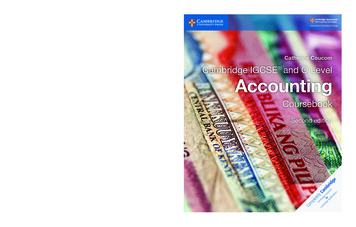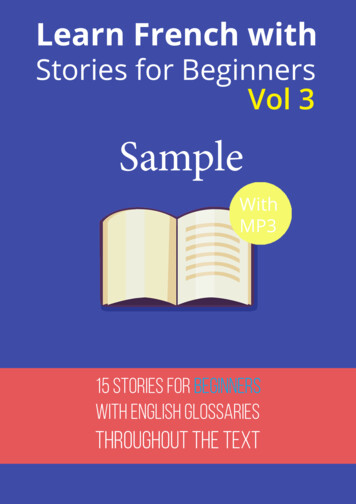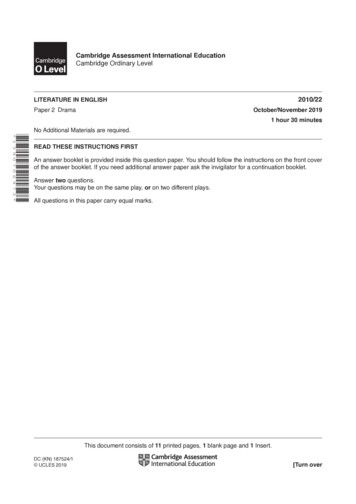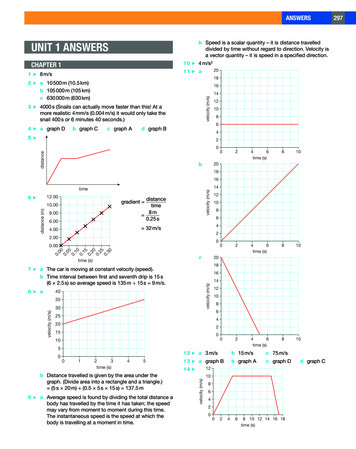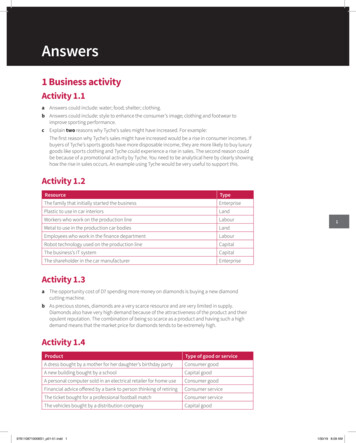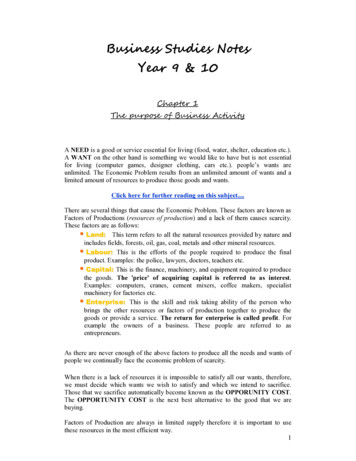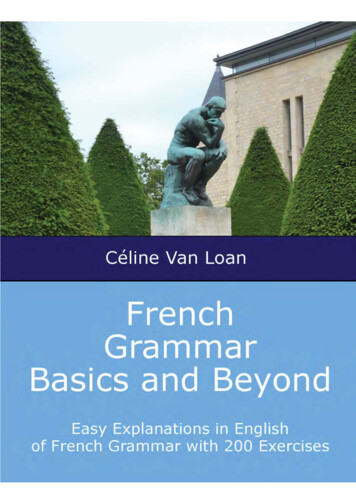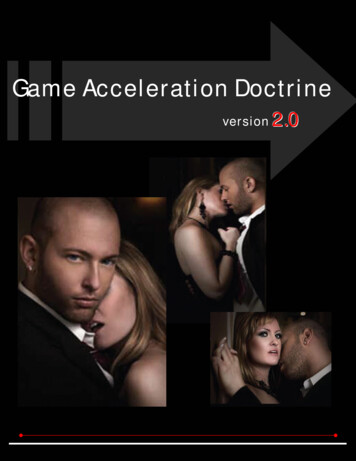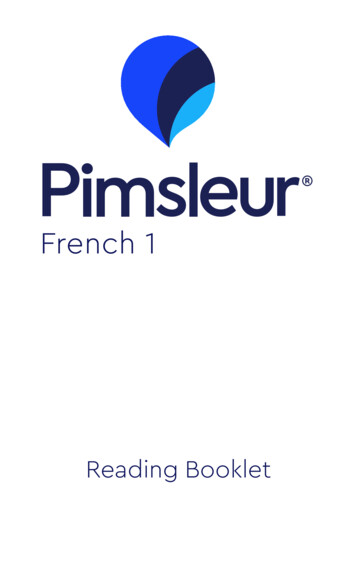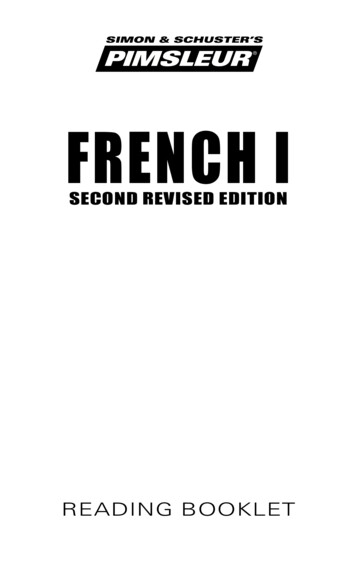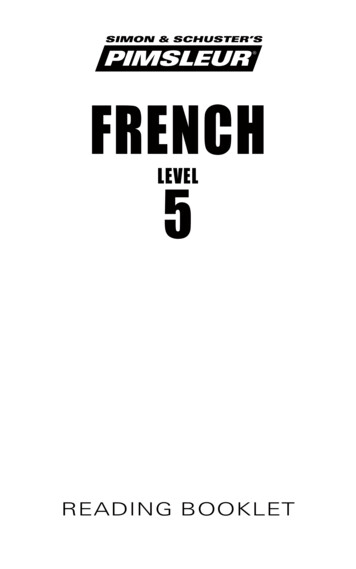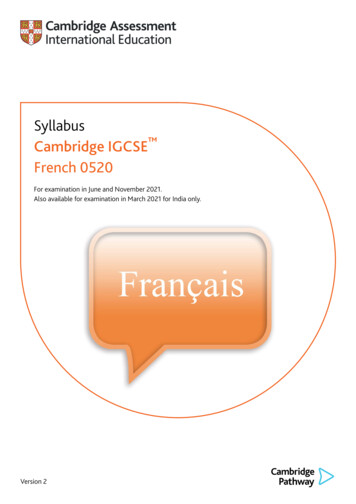
Transcription
SyllabusCambridge IGCSE French 0520For examination in June and November 2021.Also available for examination in March 2021 for India only.Version 2
Why choose Cambridge International?Cambridge Assessment International Education prepares school students for life, helping them develop an informedcuriosity and a lasting passion for learning. We are part of the University of Cambridge.Our Cambridge Pathway gives students a clear path for educational success from age 5 to 19. Schools can shapethe curriculum around how they want students to learn – with a wide range of subjects and flexible ways to offerthem. It helps students discover new abilities and a wider world, and gives them the skills they need for life, so theycan achieve at school, university and work.Our programmes and qualifications set the global standard for international education. They are created by subjectexperts, rooted in academic rigour and reflect the latest educational research. They provide a strong platform forlearners to progress from one stage to the next, and are well supported by teaching and learning resources.Our mission is to provide educational benefit through provision of international programmes and qualifications forschool education and to be the world leader in this field. Together with schools, we develop Cambridge learnerswho are confident, responsible, reflective, innovative and engaged – equipped for success in the modern world.Every year, nearly a million Cambridge students from 10 000 schools in 160 countries prepare for their future withthe Cambridge Pathway.‘We think the Cambridge curriculum is superb preparation for university.’Christoph Guttentag, Dean of Undergraduate Admissions, Duke University, USAQuality managementCambridge International is committed to providing exceptional quality. In line with this commitment, ourquality management system for the provision of international qualifications and education programmesfor students aged 5 to 19 is independently certified as meeting the internationally recognised standard,ISO 9001:2015. Learn more at www.cambridgeinternational.org/ISO9001Copyright UCLES September 2018Cambridge Assessment International Education is part of the Cambridge Assessment Group. Cambridge Assessment is the brand name ofthe University of Cambridge Local Examinations Syndicate (UCLES), which itself is a department of the University of Cambridge.UCLES retains the copyright on all its publications. Registered centres are permitted to copy material from this booklet for their owninternal use. However, we cannot give permission to centres to photocopy any material that is acknowledged to a third party even forinternal use within a centre.
Contents1 Why choose this syllabus? . 22 Syllabus overview . 5Aims5Content overview5Assessment overview6Assessment objectives73 Subject content .9Skills9Topic areas114 Details of the assessment . 12Paper 1 – Listening12Paper 2 – Reading13Paper 3 – Speaking15Paper 4 – Writing18List of grammar and structures19Vocabulary list215 What else you need to know . 44Before you start44Making entries45After the exam46How students and teachers can use the grades46Grade descriptions46Changes to this syllabus for 202147Changes to this syllabusFor information about changes to this syllabus for 2021, go to page 47.The latest syllabus is version 2, published September 2020.
Cambridge IGCSE French 0520 syllabus for 2021.1 Why choose this syllabus?Key benefitsCambridge IGCSE is the world’s most popular internationalqualification for 14 to 16 year olds, although it can be taken bystudents of other ages. It is tried, tested and trusted.Students can choose from 70 subjects in any combination – it istaught by over 4800 schools in 146 countries.Our programmes balance a thorough knowledge and understandingof a subject and help to develop the skills learners need for theirnext steps in education or employment.CambridgelearnerCambridge IGCSE French develops a set of transferable skills forunderstanding and communicating in everyday situations in French.Learners begin to develop cultural awareness of countries andcommunities where French is spoken. They acquire the essential linguistic skills required for progression to furtherstudies or employment.Our approach in Cambridge IGCSE French encourages learners to be:confident, using new and familiar structures and vocabulary to communicate with others in everyday situationsresponsible, seeking opportunities to use and develop their language skillsreflective, considering how to communicate different ideas and attitudesinnovative, applying language to a variety of situationsengaged, developing learning strategies which help them to express their ideas and their understanding of othercultures.‘The strength of Cambridge IGCSE qualifications is internationally recognised and has providedan international pathway for our students to continue their studies around the world.’Gary Tan, Head of Schools and CEO, Raffles International Group of Schools, Indonesia2www.cambridgeinternational.org/igcseBack to contents page
Cambridge IGCSE French 0520 syllabus for 2021. Why choose this syllabus?Recognition and progressionOur expertise in curriculum, teaching and learning, and assessment is the basis for the recognition of ourprogrammes and qualifications around the world. The combination of knowledge and skills in Cambridge IGCSEFrench gives learners a solid foundation for further study. Candidates who achieve grades A* to C are well preparedto follow a wide range of courses including Cambridge International AS & A Level French.Cambridge IGCSEs are accepted and valued by leading universities and employers around the world as evidence ofacademic achievement. Many universities require a combination of Cambridge International AS & A Levels andCambridge IGCSEs or equivalent to meet their entry requirements.UK NARIC, the national agency in the UK for the recognition and comparison of international qualifications andskills, has carried out an independent benchmarking study of Cambridge IGCSE and found it to be comparable tothe standard of GCSE in the UK. This means students can be confident that their Cambridge IGCSE qualificationsare accepted as equivalent to UK GCSEs by leading universities worldwide.Cambridge IGCSE French has been designed to help candidates develop language proficiency to level A2 (BasicUser) with some elements of proficiency at level B1 (Independent User) of the Common European Framework ofReference for Languages: Learning, Teaching, Assessment (CEFR).Assessment objectives, subject content, mark schemes and task types have been designed with reference to theCEFR to ensure that candidates have opportunities to demonstrate proficiency at the intended levels.Learn more at idge IGCSE is one of the most sought-after and recognised qualifications in the world. Itis very popular in Egypt because it provides the perfect preparation for success at advanced levelprogrammes.’Mrs Omnia Kassabgy, Managing Director of British School in Egypt BSEBack to contents pagewww.cambridgeinternational.org/igcse3
Cambridge IGCSE French 0520 syllabus for 2021. Why choose this syllabus?Supporting teachersWe provide a wide range of practical resources, detailed guidance, and innovative training and professionaldevelopment so that you can give your learners the best possible preparation for Cambridge IGCSE.Teaching resourcesExam preparation resources . School Support Hubwww.cambridgeinternational.org/support . Question papers .Syllabuses . Schemes of work . Example candidate responses to understandwhat examiners are looking for at key grades . Learner guides . Examiner reports to improve future teaching . Mark schemes . Discussion forums . Endorsed resourcesTraining . Introductory – face-to-face or online . Extension – face-to-face or online . Enrichment – face-to-face or online . Coursework – online . Cambridge Professional DevelopmentQualificationsSupport forCambridgeIGCSECommunityYou can find useful information, as well asshare your ideas and experiences with otherteachers, on our social media channels andcommunity forums.Find out more atwww.cambridgeinternational.org/social-mediaFind out more idgeinternational.org/igcseBack to contents page
Cambridge IGCSE French 0520 syllabus for 2021.2 Syllabus overviewAimsThe aims describe the purposes of a course based on this syllabus.The aims are to enable students to: develop the language proficiency required to communicate effectively in French at level A2 (CEFR Basic User),with elements of level B1 (CEFR Independent User) offer insights into the culture and society of countries and communities where French is spoken develop awareness of the nature of language and language learning encourage positive attitudes towards speakers of other languages and a sympathetic approach to other cultures provide enjoyment and intellectual stimulation develop transferable skills (e.g. memorising, drawing of inferences) to complement other areas of thecurriculum form a sound base of the skills, language and attitudes required for progression to work or further study, eitherin French or another subject area.Content overviewThe subject content is organised in five broad topic areas (A–E below). These provide contexts for the acquisitionof vocabulary and the study of grammar and structures. The study of these topic areas enables students to gain aninsight into countries and communities where French is spoken. The five topic areas listed below are described inmore detail in section 3.A. Everyday activitiesB. Personal and social lifeC. The world around usD. The world of workE. The international worldThe syllabus gives students opportunities to develop and apply a wide range of foreign language skills.Candidates will be expected to read and understand a variety of written and spoken texts on familiar topics.Candidates will be required to demonstrate understanding of the main ideas, opinions and attitudes, as well asselect and extract relevant details and deduce the meaning of occasional unknown words from context.They will also have opportunities to write in French on familiar, everyday topics, and to speak the language bytaking part in everyday conversations.Support for Cambridge IGCSE FrenchOur School Support Hub www.cambridgeinternational.org/support provides Cambridge schools with asecure site for downloading specimen and past question papers, mark schemes, grade thresholds and othercurriculum resources specific to this syllabus. The School Support Hub community offers teachers theopportunity to connect with each other and to ask questions related to the syllabus.Back to contents pagewww.cambridgeinternational.org/igcse5
Cambridge IGCSE French 0520 syllabus for 2021. Syllabus overviewAssessment overviewAll candidates take all four papers. Candidates will be eligible for grades A* to G.All candidates take:and:Paper 1ListeningPaper 2ReadingApproximately 50 minutes25%1 hour25%40 marks45 marksCandidates listen to a number of recordingsand answer multiple-choice and matchingquestions.Candidates read a number of texts and answermultiple-choice and matching questions aswell as questions requiring short answers.Externally assessedExternally assessedand:and:Paper 3SpeakingApproximately 10 minutes25%Paper 4Writing1 hour25%40 marks45 marksCandidates complete one role play andconversations on two topics.Candidates complete one form-filling task,one directed writing task and one task in theformat of an email/letter or article/blog.Internally assessed and externally moderatedExternally assessedInformation on availability is in the Before you start section.6www.cambridgeinternational.org/igcseBack to contents page
Cambridge IGCSE French 0520 syllabus for 2021. Syllabus overviewAssessment objectivesThe assessment objectives (AOs) are:AO1 ListeningL1:. understand the main points and key information in simple everyday materialL2:. understand clear speech on a range of familiar topicsL3:. understand the description of events and expression of ideas, opinions and attitudes in simple textsL4:. identify and select relevant information in predictable textsAO2 ReadingR1:. understand the main points and key information in simple everyday materialR2:. understand authentic factual texts on a range of familiar topicsR3:. understand the description of events and expression of ideas, opinions and attitudes in simple textsR4:. identify and select relevant information in predictable textsAO3 SpeakingS1:. communicate clearly and effectively in a range of predictable everyday situationsS2:. engage in conversations on familiar topics, expressing opinions and feelingsS3:. use a range of structures and vocabulary with reasonable accuracyS4:. demonstrate some ability to maintain interactionS5:. show some control of pronunciation and intonationAO4 WritingW1:. communicate simple factual information clearly for everyday purposesW2:. write simple phrases and sentences on a familiar topicW3:. write simple connected texts describing events, experiences, opinions and hopes and ambitionsW4:. use a range of simple vocabulary and language structures reasonably accuratelyBack to contents pagewww.cambridgeinternational.org/igcse7
Cambridge IGCSE French 0520 syllabus for 2021. Syllabus overviewWeighting for assessment objectivesThe approximate weightings allocated to each of the assessment objectives (AOs) are summarised below.Assessment objectives as a percentage of the qualificationAssessment objectiveWeighting in IGCSE %AO1 Listening25AO2 Reading25AO3 Speaking25AO4 Writing25Total100Assessment objectives as a percentage of each componentAssessment objectivePaper 1Paper 2Paper 3Paper 4AO1 Listening100–––AO2 Reading–100––AO3 Speaking––100–AO4 Writing–––100100100100100Total8Weighting in components %www.cambridgeinternational.org/igcseBack to contents page
Cambridge IGCSE French 0520 syllabus for 2021.3 Subject contentSkillsThe skills covered in the syllabus are outlined below.Listening Understand short recordings dealing with everyday needs (e.g. simple transactions in shops, simpledirections or instructions). Understand factual information and ideas from a range of sources (e.g. announcements, phone messages,news items, interviews, dialogues) on familiar topics. Understand descriptions of events, opinions, emotions, hopes and ambitions in simple texts (e.g. in radiobroadcasts, interviews, dialogues). Identify main points, specific information and details on everyday topics (e.g. personal and familyinformation, shopping, local area, employment, school, leisure activities). Identify main points, themes, opinions, ideas, emotions and attitudes in predictable texts (e.g. news reports,conversations, interviews, simple monologues). Deduce the meaning of occasional unknown words and expressions from the context.Reading Understand short, simple texts (e.g. signs and notices in public places, such as streets, restaurants and bus/railway stations and airports). Understand authentic texts on familiar topics and situations (e.g. newspaper/magazine articles, emailmessages, blogs and letters). Understand descriptions of events, opinions, emotions, hopes and ambitions in simple texts (e.g. in articles,interviews or personal messages). Identify main points, specific information and details in predictable texts (e.g. advertisements, brochures,menus, timetables, instructions, messages). Identify main points, themes, opinions, ideas, emotions and attitudes in predictable texts (e.g. newspaper/magazine articles, simple plots of films or books). Deduce the meaning of occasional unknown words and expressions from the context.Speaking Participate in short social exchanges (e.g. greet people, make and respond to invitations, apologies) andcommunicate on familiar topics to meet simple needs (e.g. order food and drink, simple transactions inshops, use public transport, ask and give directions, request information). Participate in unprepared conversations on familiar topics of personal interest or relevant to everyday life(e.g. family, friends, home environment, hobbies and interests, education, work, travel). Describe past events and experiences, hopes and ambitions and give brief reasons for opinions and plans. Communicate with reasonable accuracy, using a range of structures, tenses and vocabulary relevant to thegiven situation. Use simple connectors (e.g. and, but, because, then) to link a series of shorter discrete elements into aconnected sequence of points. Use appropriate strategies to maintain interaction. Use features of pronunciation and intonation to convey meaning and attitude.Back to contents pagewww.cambridgeinternational.org/igcse9
Cambridge IGCSE French 0520 syllabus for 2021. Subject contentWriting10 Fill in forms providing simple details. Communicate simple factual information in writing using everyday vocabulary and expressions. Write a series of simple phrases and sentences linked with simple connectors, relating to personal life,immediate environment and everyday topics (e.g. writing about a holiday). Write simple connected texts (e.g. email messages, articles) on familiar topics (e.g. plans and arrangements,likes and dislikes, family, home environment, hobbies and interests, education, work and travel). Describe past events and experiences, opinions, hopes and ambitions and give brief reasons for opinionsand plans. Communicate with reasonable accuracy, using a range of structures, tenses/time frames and vocabularyrelevant to the given situation. Use simple connectors (e.g. and, but, because, then) to link a series of shorter discrete elements into aconnected sequence of points.www.cambridgeinternational.org/igcseBack to contents page
Cambridge IGCSE French 0520 syllabus for 2021. Subject contentTopic areasCandidates will be required to show knowledge and understanding of the broad topic areas listed below. These providecontexts for the acquisition of vocabulary and the study of grammar and structures. Through the study of these broadtopic areas, candidates gain insight into the cultures of countries and communities where French is spoken.The sub-topics listed are provided as examples of what teachers may choose to focus on. They are examples only and arenot intended to be prescriptive or exhaustive.AreaTopic AreasSub-topicsAEveryday activities Time expressions (e.g. telling the time, days, days of theweek, months, seasons) Food and drink (e.g. meals, fruit and vegetables, meat, fishand seafood, snacks, drinks, cutlery and utensils) The human body and health (e.g. parts of the body, healthand illness) Travel and transport Self, family and friends In the home (e.g. rooms, living room, kitchen, bedroom,bathroom, furniture and furnishings, garden, householdappliances) Colours Clothes and accessories Leisure time (e.g. things to do, hobbies, sport) People and places (e.g. continents, countries andnationalities, compass points) The natural world, the environment, the climate and theweather Communications and technology (e.g. the digital world,documents and texts) The built environment (e.g. buildings and services, urbanareas, shopping) Measurements (e.g. size, shape) Materials Education (e.g. learning institutions, education and training,the classroom, learning tools, subjects, studying) Work (e.g. jobs and careers, the workplace) Countries, nationalities and languages Culture, customs, faiths and celebrationsBCDEBack to contents pagePersonal and social lifeThe world around usThe world of workThe international worldwww.cambridgeinternational.org/igcse11
Cambridge IGCSE French 0520 syllabus for 2021.4 Details of the assessmentAll questions requiring written responses are to be answered in French.Dictionaries are not allowed in the examination.Paper 1 – ListeningApproximately 50 minutes including 6 minutes' transfer time, 40 marksThis paper consists of 37 multiple-choice and matching questions. Candidates answer all questions by selecting thecorrect option or options. Each question tests comprehension of recorded texts (e.g. dialogues, announcements,conversations). Candidates hear each recorded text twice. At the end of the test candidates will be asked to transfertheir answers onto the separate answer sheet.Centres must check the Cambridge Handbook for the year candidates are taking the assessment. TheCambridge Handbook tells you when and how to access the audio material for each examination ers/invigilators must consult the relevant sections of the Cambridge Handbook about administering thelistening examination and for details about rooms, equipment, guidance on acoustics and checking the audiomaterial in advance.Description of questionsQuestions 1–8Assessment objectiveL1TaskCandidates listen to short texts and answer eight multiple-choice questions withfour options.Text typesAnnouncements, phone messages, news items, or dialoguesTotal marks8Questions 9–14Assessment objectiveL1, L2, L4TaskCandidates listen to a monologue or dialogue containing factual information andanswer six multiple-choice questions with four options.Text typesShort monologues or dialoguesTotal marks6Questions 15–1912Assessment objectiveL2, L3, L4TaskCandidates listen to a conversation and match the names of people, places,items or activities with the correct statements.Text typesInformal conversationsTotal marks5www.cambridgeinternational.org/igcseBack to contents page
Cambridge IGCSE French 0520 syllabus for 2021. Details of the assessmentDescription of questions (continued)Questions 20–28Assessment objectiveL2, L3, L4TaskCandidates listen to a dialogue (conversation, discussion or interview) or,alternatively, two shorter dialogues (each with a different person, on a commontheme) and answer nine multiple-choice questions with three options.Text typesConversations, interviewsTotal marks9Questions 29–34Assessment objectiveL2, L3, L4TaskCandidates listen to a dialogue (conversation, discussion or interview) andanswer six multiple-choice questions with four options.Text typesConversation, discussion or interviewTotal marks6Questions 35–37Assessment objectiveL2, L3, L4TaskCandidates listen to a conversation/discussion or interview. In each questionthere are five options and candidates must select the two options whichare true.Text typesConversation, discussion or interviewTotal marks6Paper 2 – ReadingWritten paper, 1 hour, 45 marksThis paper consists of six groups of questions, each comprising a number of multiple-choice and matchingquestions, as well as questions requiring short answers in French. The number of questions in each group may varyin each examination session.Description of question groupsQuestion group 1Assessment objectiveR1TaskCandidates match a series of short statements with the correct pictures.Text typesSimple descriptionsTotal marks5Question group 2Assessment objectiveR1TaskCandidates match a series of short notices or signs commonly found in publicplaces with an explanatory statement. The texts are all set in the same context.Text typesSigns, notices, instructions, messages, advertisementsTotal marks5Back to contents pagewww.cambridgeinternational.org/igcse13
Cambridge IGCSE French 0520 syllabus for 2021. Details of the assessmentQuestion group 3Assessment objectiveR2, R4TaskCandidates answer multiple-choice questions with three options on a short text.Text typesEmail, message, postcard or letterTotal marks7Question group 4Assessment objectiveR2, R4TaskCandidates answer questions on a longer text requiring short responsesin French.Text typesEmail, message, letter or blogTotal marks12Question group 5Assessment objectiveR3TaskCandidates match a series of descriptions of the requirements, interests or skillsof different people with the correct description of places, events, services oractivities. All texts are on a common theme.Text typesShort descriptions, advertisementsTotal marks5Question group 6Assessment objectiveR3, R4TaskCandidates answer questions on a longer text requiring short responsesin French.Text typesArticlesTotal marks11Paper 3 – SpeakingApproximately 10 minutes (plus 10 minutes of preparation time), 40 marksEach speaking test lasts approximately 10 minutes, and is structured as follows: a warm-up section which is not assessed (approximately 30 seconds) one role play – candidates respond to five transactional questions to, for example, accomplish a task or obtaingoods or services (approximately two minutes) two topic conversations – candidates respond to questions on each topic to share views, opinions andexperiences (four minutes per topic conversation).Both the role play and the topic conversations are set in predictable, everyday contexts and are based on the topicareas outlined in the k to contents page
Cambridge IGCSE French 0520 syllabus for 2021. Details of the assessmentDuring the preparation time, candidates study a role play scenario provided on a candidate card. They must besupervised under exam conditions. Candidates are not allowed to make notes.The tests are conducted and marked by the teacher/examiner using the speaking assessment materials andassessment criteria provided. They are moderated by Cambridge International.Speaking tests take place before the main examination series (see the relevant series’ timetable). Before thespeaking test period, centres will receive materials for the test. Teachers/examiners must allow sufficient time tofamiliarise themselves with the materials and procedures (see the Cambridge Handbook for details).Cambridge International supplies a teacher/examiner booklet comprising instructions, assessment criteria andteacher/examiner scripts for the role plays and topic conversations. Candidate cards containing the role playscenarios are also supplied.The teacher/examiner allocates a role play and two topic conversations to each candidate according to arandomisation grid provided in the teacher/examiner instruction booklet.Administration of the speaking testFurther information about the administration of speaking tests is provided in the Cambridge Handbook,available from our website. For copies of the forms required for the speaking test as well as informationabout the deadlines, sample size and methods of submission, please refer to the samples database atwww.cambridgeinternational.org/samplesInternal moderationIf more than one teacher in your centre is marking internal assessments, you must make arrangementsto moderate or standardise your teachers’ marking so that all candidates are assessed to a commonstandard. There is further information on the process of internal moderation on the samples database atwww.cambridgeinternational.org/samplesYou should record the internally moderated marks for all candidates on the Working Mark Sheet and submit thesemarks to Cambridge International according to the instructions set out in the Cambridge Handbook.External moderationCambridge International will externally moderate all internally assessed components. You must submit the marks of all candidates to Cambridge International. You must also submit the marked work of a sample of candidates to Cambridge International.The sample you submit to Cambridge International should include examples of the marking of each teacher.The samples database at www.cambridgeinternational.org/samples provides details of how the sample will beselected and how it should be submitted.External moderators will produce a short report for each centre with feedback on your marking and administrationof the assessment.Back to contents pagewww.cambridgeinternational.org/igcse15
Cambridge IGCSE French 0520 syllabus for 2021. Details of the assessmentSpeaking assessment criteria gridsRole playEach of the five role play tasks is assessed using the mark scheme below:2The information is communicated. Language is appropriate to the situation and is accurate.Minor errors (adjective endings, use of prepositions, etc.) are allowed.1The information is partly communicated and/or the meaning is ambiguous.Errors impede communication.0No creditable response.Topic conversationsWhen both topic conversations have been completed, give a mark out of 15 for Communication and a mark out of15 for Quality of Language.CommunicationGive a mark out of 15 for the candidate’s performance in both topic conversations.MarkLevelDescriptor13–15Very good Responds confidently to questions; may occasionally need repetition of wordsor phrases. Communicates information which is consistently relevant to the questions. Frequently develops ideas and opinions. Justifies and explains some answers. Responds well to questions; requires occasional use of the alternativequestion(s) provided. Communicates information which is almost always relevant to the questions. Sometimes develops ideas and opinions. Gives reasons or explanations for some answers. Responds satisfactorily to questions; frequently requires use of the alternativequestion(s) provided. Communicates most of the required information; may occasionally giveirrelevant information. Conveys simple, straightforward opinions. Has difficulty with many questions but still attempts an answer. Communicates some simple information relevant to the questions. Frequently has difficulty understanding the questions and has grea
Our expertise in curriculum, teaching and learning, and assessment is the basis for the recognition of our programmes and qualifications around the world. The combination of knowledge and skills in Cambridge IGCSE French gives learners a solid foundation for further study
